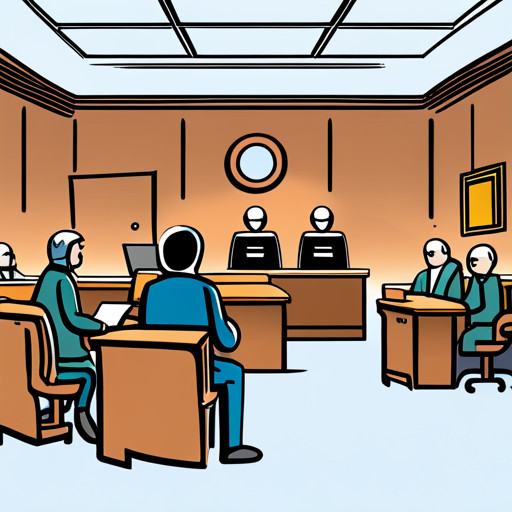Google Settlement Resolves Referrer Header Privacy Lawsuit
This article examines the recent $23 million settlement agreement reached by Google in the 'In re: Google Referrer Header Privacy Litigation'.

It provides a comprehensive analysis of the case background, key settlement details, eligibility criteria, and claim filing procedures.
It further elucidates the roles of class and defense counsels, the settlement administrator, and payment distribution processes.
This exploration offers valuable insight into this significant legal resolution and its implications for user privacy.
Key Takeaways
- The lawsuit is titled 'In re: Google Referrer Header Privacy Litigation'.
- Google has agreed to a $23 million settlement to resolve claims of sharing search queries with third-party websites without user consent.
- Class members can receive an equal share of the net settlement fund, with an estimated individual payment of $7.70.
- The settlement benefits Google Search users who clicked on a search result in the United States between October 26, 2006, and September 30, 2013.
Understanding the Background of Google’s Referrer Header Privacy Lawsuit

The lawsuit titled 'In re: Google Referrer Header Privacy Litigation' pertains to Google's agreement to a $23 million settlement to resolve claims of sharing search queries with third-party websites without user consent, although the company has not admitted any wrongdoing.
This case has raised significant concerns regarding user privacy and data protection. The potential impact of such practices could be substantial, affecting the privacy of millions of internet users.
Despite the settlement, the issue of user consent remains paramount, underlining the necessity for technology companies to prioritize user privacy in their operations.
This case serves as a reminder of the ongoing challenges in maintaining user privacy in the digital age, especially in the face of complex and often opaque data sharing practices.
Key Details Surrounding the Google Settlement

Key details surrounding this case indicate that the total amount agreed upon for resolution is $23 million, with potential individual rewards estimated at $7.70. The settlement impact will be determined by the total number of claimants, with the effect of this case potentially influencing Google's privacy practices in the future.
Here are some essential details in a simplified format:
| Settlement Amount | Potential Individual Reward |
|---|---|
| $23 Million | $7.70 |
Furthermore, the conclusion of this lawsuit may set a precedent for other technology companies, emphasizing the importance of transparency and consent in handling user data. The final impact of this settlement remains to be seen, yet it underlines the ongoing struggle between data privacy and digital innovation.
Eligibility Criteria for Partaking in the Settlement

Eligibility for participation in this resolution process is extended to users who interacted with the search engine within a specific timeframe, as outlined in the settlement terms.
- Settlement requirements necessitate that interaction with the search engine should have occurred between October 26, 2006, and September 30, 2013.
- Compensation distribution will be accomplished through an equal sharing of the net settlement fund among eligible class members.
- Filing a valid claim by July 31, 2023, is mandatory to receive a settlement payment.
- Eligibility does not demand proof of purchase or interaction.
These criteria aim to ensure a fair distribution of the settlement funds while maintaining the integrity of the resolution process.
It is recommended that potential claimants review the settlement terms in detail.
How to File a Claim: A Step-by-Step Guide

Understanding the claim filing process is crucial for potential claimants who seek to receive their share of the resolution funds. The filing process involves several steps, which include meeting the claim requirements, filling out the claim form, and submitting it before the deadline. The claim requirements entail being a Google Search user within the stipulated period and not have excluded oneself from the class action.
| Step | Description |
| 1 | Confirm eligibility |
| 2 | Complete claim form |
| 3 | Submit form |
| 4 | Await settlement payment |
| 5 | Contact settlement administrator for any queries |
The table summarizes the steps involved in the filing process. It is essential for claimants to understand this process to ensure that they meet all claim requirements and deadlines. Missteps can result in non-receipt of settlement funds.
Communicating With the Claim’s Administrator: Essential Information

Communicating effectively with the claim's administrator is crucial for claimants to stay informed about the claim status and any potential updates in the settlement process. By doing so, claimants ensure that their claim submission is correct, complete, and submitted within the specified time frame. Understanding the settlement process helps claimants to manage expectations and prepare for potential outcomes.
Regular communication with the claim's administrator provides updates on claim status and any changes in the settlement process.
Seeking guidance can help avoid errors or omissions in the claim submission.
Understanding the settlement process can help manage expectations regarding the timeline and potential reward.
Being proactive can ensure that claimants receive their rightful share from the settlement.
Role and Responsibilities of the Class Counsel and Defense Counsel

Having established the importance of communicating with the claim's administrator, attention now shifts to the role of class counsel and defense counsel.
The class counsel, representing the class members, plays a pivotal role in presenting the legal arguments and negotiating the settlement terms.
On the other hand, the defense counsel, representing Google, is responsible for countering these arguments and striving to minimize the settlement amount.
In terms of the legal implications of the settlement, Google has not admitted any wrongdoing, which signifies no legal admission of liability.
However, the settlement does carry financial consequences for Google, and it may also impact the company's future policies and practices regarding user data privacy.
Tracking Your Claim: How and Where
Monitoring the status of a claim can be achieved by regular contact with the settlement administrator or the respective attorney, providing essential updates on the progress and eventual resolution of the claim.
- The settlement administrator is a valuable resource in tracking claim status, offering updates on the processing and resolution of submitted claims.
- Required claim documents are essential for the successful processing of a claim. These can include proof of purchase, signed declaration, or any other relevant evidence.
- Regular updates on claim status aid in keeping the claimant informed and prepared for any necessary actions.
- In addition to tracking claim status, ongoing communication with the settlement administrator or attorney ensures that all required claim documents are correctly and timely submitted.
Thus, continuous monitoring allows for a smoother and more predictable claim process.
Role of the Settlement Administrator in the Lawsuit

In the realm of class action lawsuits, the settlement administrator plays a critical role. They are tasked with handling claim processing, providing updates on claim status, answering questions regarding claim forms, and distributing the settlement payments to eligible claimants. This role is instrumental in ensuring the smooth execution of the lawsuit settlement process.
The importance of privacy protection is also a significant aspect of the settlement administrator's duties. They are responsible for maintaining the confidentiality of sensitive claimant information. This duty is crucial in safeguarding the privacy rights of the individuals involved in the lawsuit.
Moreover, the settlement administrator acts as a liaison between the claimants and the court. They provide necessary updates and information to both parties, facilitating effective communication and ensuring that all parties are well-informed throughout the settlement process.
Overall, the settlement administrator's role is pivotal in promoting transparency, efficiency, and fairness in the settlement process. Their duties are indispensable in class action lawsuits, as they help to uphold the principles of justice and ensure that the rights of the claimants are protected.
Payment Distribution: What to Expect and When?

Having discussed the role of the settlement administrator in the lawsuit, attention now shifts towards the payment distribution timeline. This aspect carries significant importance as it provides class members with a temporal reference for expecting their settlement payments.
- The settlement administrator is responsible for the distribution of payments.
- The payment distribution timeline tends to vary depending on several factors, including the number of claimants.
- Class members are typically informed about the distribution timeline after the claim submission deadline.
- Payments are usually made via check and mailed to the class members.
The conclusion of this lawsuit may have a potential impact on Google's privacy practices. As a part of a broader dialogue on data privacy, the resolution could influence Google to reassess and potentially modify its existing privacy policies and practices.
Frequently Asked Questions
What Was the Initial Complaint That Led to the 'In Re: Google Referrer Header Privacy Litigation' Lawsuit?
The initial complaint that instigated the 'In re: Google Referrer Header Privacy Litigation' lawsuit pertained to privacy implications concerning the unauthorized sharing of user search queries with third-party websites.
This alleged violation of privacy rights formed the crux of the lawsuit background, leading to a legal dispute over whether Google had overstepped its bounds by disseminating potentially sensitive user information without obtaining explicit consent.
How Did Google Allegedly Share Search Queries With Third-Party Websites Without User Consent?
The alleged sharing of search queries with third-party websites by Google purportedly occurred without user consent, raising significant privacy implications.
The referrer headers, automatically sent by web browsers when a link is clicked, contained user search queries. These were ostensibly shared with third-party websites without informing users, ostensibly infringing upon their privacy rights.
User awareness of such practices was arguably limited, heightening the potential for privacy violations.
How Is the Total Settlement Amount of $23 Million Distributed Among the Class Members?
The distribution of the $23 million settlement involves a process of equally dividing the net funds among valid claimants. This process is termed 'Settlement Distribution'.
Eligibility to be a class member is determined by specific criteria, including the use of Google Search within a defined period.
The estimated individual payment is $7.70, but this may fluctuate depending on the total number of successful claimants.
No admission of wrongdoing has been made by Google.
If I Have Used Google Search but Cannot Recall Specifically Clicking on a Search Result During the Specified Period, Am I Still Eligible to File a Claim?
Claim eligibility in this instance hinges on demonstrable engagement with Google Search's results within the specific time frame. However, precise recollection of individual search behavior is not a prerequisite for filing a claim.
The implications of search behaviors underscore the necessity for a broad interpretation of eligibility criteria. Therefore, potential claimants who utilized Google Search during the stated period may be eligible, even without specific memory of clicking on search results.
Are There Any Potential Legal Repercussions for Google Despite Not Admitting Any Wrongdoing in the Settlement Agreement?
The settlement implications for Google, despite not admitting any wrongdoing, can be manifold.
Legal repercussions could include a closer scrutiny of its privacy practices by regulatory bodies.
Moreover, Google's accountability may be questioned in public opinion, potentially impacting its brand reputation.
This settlement might also set a precedent for future privacy-related lawsuits, necessitating more stringent privacy control measures from Google and other similar entities.

This post has been generated by AI and was not reviewed by editors. This is Not legal advice. Please consult with an attorney.




